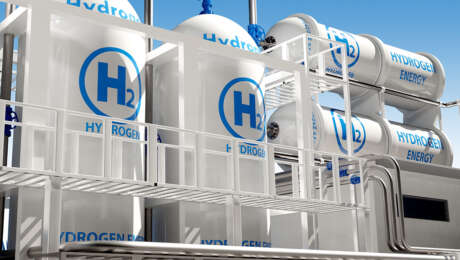For the past 40 years, hydrogen has been mostly used as rocket fuel, in oil refineries and in fertilizers. However, the interest in hydrogen as a clean fuel and energy carrier of the future has grown in many countries and initiated comprehensive research and development activities with the main objective of the transition from a fossil towards a CO2 emission lean energy source as the ultimate goal.
Given its high energy content and clean energy source to the end-user, hydrogen has become an acceptable fuel for many energy applications and systems. Hydrogen can be stored and transported as a compressed gas, however, due to its comparatively small energy content per unit volume as a gas, it is necessary to liquefy the hydrogen. Similar to LNG, large amounts of hydrogen can be stored and transported as a liquid.
Given the complex conditions in which hydrogen can be used and stored, it is important to understand all the possible nuisances of this fuel in order to define basic safety specifications and avoid possible pitfalls. This is especially true given the very high reactivity of hydrogen, its extensive flammability range, extremely low ignition energy, and its ease of transitioning to detonations when compared to other hydrocarbons.
Understanding important combustion phenomena, including fires and explosions, is critical to ensure the safe use of hydrogen no matter if it is used as a compressed gas or cryogenic liquid.
During the 2022 Spring Meeting and 18th Global Congress on Process Safety, Gexcon US CEO & Principal Engineer Scott G. Davis, PhD, P.E., CFEI will present a paper entitled “Improving Our Understanding of Hydrogen through Testing and Advanced Modeling to Avoid Possible Pitfalls and Ensure Its Safe Use”.
Dr Davis will identify the critical combustion parameters associated with hydrogen and discuss its unique properties when it comes to evaluating unintentional releases of the substance. He will also discuss the latest research into the releases of both gaseous and liquid hydrogen, the resulting vapour formation and dispersion of hydrogen both indoors and outdoors, jet fires associated with releases of gaseous and liquefied hydrogen, and explosion hazards. The focus will be to ensure that hydrogen is used safely and that certain pitfalls associated with its use are avoided due to the unique properties of the fuel.
Presentation detail
Title: Improving Our Understanding of Hydrogen through Testing and Advanced Modeling to Avoid Possible Pitfalls and Ensure Its Safe Use
Author: Scott G. Davis
Session: Alternative Energy Infrastructure Safety
Presenter: Scott G. Davis
Date & Time: Wednesday, April 13, 2022 – 11:15 – 11:45 AM CDT


















